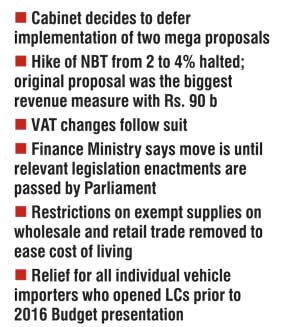Monday Feb 16, 2026
Monday Feb 16, 2026
Thursday, 14 January 2016 00:45 - - {{hitsCtrl.values.hits}}
The Government yesterday decided to defer the  implementation of two major revenue proposals in addition to extending relief to people and the private sector in moves that expose lack of credibility in Budget making and late realisations.
implementation of two major revenue proposals in addition to extending relief to people and the private sector in moves that expose lack of credibility in Budget making and late realisations.
In a short statement the Finance Ministry said amendments proposed to Value Added Tax (VAT) and Nation Building Tax (NBT) Proposed in Budget 2016 should not be implemented until the relevant legislative enactments are passed by Parliament. “However, considering the cost of living impact, restriction on the exempt supplies applicable on wholesale and retail trade (deemed VAT) is removed with effect from 01.01.2016,” it added.
The Finance Ministry also said vehicle importers who have imported motor vehicles for personal use on LCs opened before Budget 2016 are permitted to be cleared from Customs by paying the duties under the rate that prevailed at 20.11.2015, without paying any demurrages.
Some of these proposals were widely criticised by different stakeholders soon after the 2016 Budget was presented on 20 November by the unity Government.
It couldn’t be confirmed whether the Finance Ministry would revise the core VAT and NBT proposal but their deferment is likely to add more pressure on the President Maithripala Sirisena and Prime Minister Ranil Wickremesinghe Government to be more credible in Budget making.
Private sector welcomed the changes saying better late than never but greater clarity is being demanded since from day one of the 2016 Budget presentation confusion has reigned. Widespread criticism during the debate also saw the Government shelving at least 10 proposals from the original version.
The changes to NBT were to rake in the highest revenue of Rs. 90 billion to the Government. Its impact was criticised for the same reason.
Analysts said the hike in NBT was viewed as negative since a majority of companies were passing on the impact to the end consumer. This in turn was putting pressure on prices.
In proposing changes to NBT, Finance Minister Karunanayake on 20 November proposed to reduce the NBT threshold in line with VAT, and the rate will be increased to 4% and certain exemptions will be removed. “Revenue generated from the increase of rate will be transferred to the Consolidated Fund,” he added.
Previously, telecommunication services, supply of electricity and lubricants were exempted from 2% NBT and the Budget 2016 move meant their inclusion as well at a higher 4% rate.
Budget 2016 also proposed that the threshold be revised to Rs 3 million per quarter and the threshold of Rs 25 million per quarter be removed except for any locally procured agricultural produce in the preparation for sale.
In proposing the changes to VAT, the Finance Minister said the VAT system in Sri Lanka was severely distorted due to the ad hoc policies adopted from time to time over the past few years. Under-invoicing of imports, leakages in the value chain and long lists of exemptions resulted in low revenue below expectation. He proposed to remove certain exemptions with the view to increase revenue. The present single rate was revised to 3 bands: 0%, standard rate of 8% and 12.5% higher rate for the services sector and the minimum threshold for the liability for VAT will be Rs.12 million per annum. The wholesale and retail trade will be excluded from VAT.
The new moves meant the service sector will be liable to VAT at 12.5% while manufacturers and import traders will be liable to VAT at 8%. Manufacturers and importers will face a restriction of 4.5% on input tax from services procured (i.e. 12.5% - 8%) similar to the previous rule of claiming input of 12% on luxury rate items which were liable at 20%.